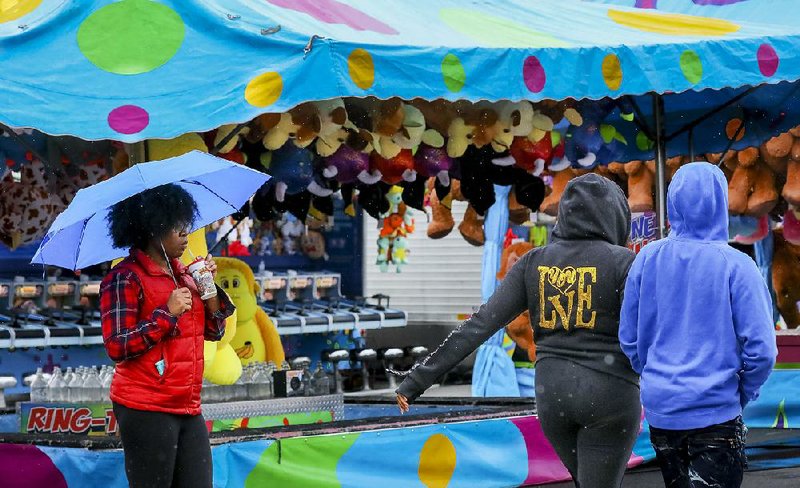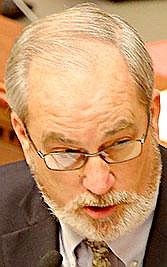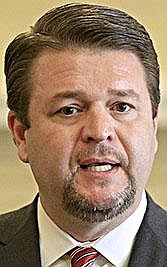A divided Arkansas Legislative Council authorized that nearly $1 million in state rainy-day funds be made available to the nonprofit that runs the Arkansas State Fair, but not before it got an earful from lawmakers who have taken heat from constituents.
In a split voice vote, the council heeded a subcommittee's Wednesday recommendation to sign off on Gov. Asa Hutchinson's request for up to $911,050 for the Arkansas Livestock Show Association, which had a budget shortfall resulting from this fall's rain-soaked fair.
After pausing briefly, council co-chairman Rep. Jim Dotson, R-Bentonville, ruled that the motion approving the request passed.
Before the vote, several lawmakers grilled the association's interim General Manager and President Doug White for about 20 minutes about what steps officials are taking to shore up the fair's finances.
State Rep. Kim Hammer, R-Benton, warned White that "you would be hard-pressed to come back around next year and expect to get any money."
Rep. Mary Bentley, R-Perryville, told White that "you came to committee the other day and reported that you needed these funds because you had six days of rain" during the 10-day fair in October.
"I just want you to know that I was bombarded with calls from my folks back home with their county fairs who volunteer their time or can't get [state General Improvement Funds] anymore, so they were very disturbed," said Bentley, whose district includes parts of Conway, Perry, Pope and Yell counties.

Cynthia Bearden, a part-time accountant for the fair association, said the $5.6 million budget for this year has been trimmed to $4.3 million for 2019.
White told lawmakers that the association would use the rainy-day funds to pay some livestock premiums, advertising and media expenses for the fair, some vendors and other expenses, and "put us in a positive cash flow going towards the new calendar year."
The association has about $120,000 in reserves, he said.
"We are looking at cost cutting, along with other revenue opportunities, so that we don't have to come back here and ask for money," he said.
Bentley pressed White about how much the state fair's gate fees and concessions dropped this year as compared with last year because "I know you really depend on your fair to make ends meet."
White said overall revenue from this year's fair was about $700,000 lower than the average for the three previous years.
Concession revenue was down by about 30 percent, and gate revenue was "down by 20-something percent," he said.
Direct comparison is difficult, he said, "because we contracted with a new carnival group this year, but ... our carnival income was down as well, so [losses were] across the board and all due to the six days of rain, particularly the two days of rain on the weekends," White said.
Bentley said a private audit showed that the Arkansas Livestock Show Association's payroll is about $900,000 a year, so she wondered how many full-time employees the association has.
The association started 2018 with 18 full-time employees, and "in the past three weeks we have reduced that to 10 full-time employees," White said.
The association's board has decided to take a more active role in the day-to-day operations, he said, and has already reduced next year's payroll expenses by about $500,000.
"I am looking at every single line item, along with our accountant, along with our associates at [the state finance department] to ensure we don't make those mistakes again," White said.
White said the association also receives about $880,000 a year from state government.
Sen. Bart Hester, R-Cave Springs, said "I have a lot of confidence because people like [Sen.] Bruce Maloch are on your board.
"But we have real needs in our state from 911 that are real immediate needs that save people's lives, and to just continue to dump another $1 million a year into the State Fair that can't even operate at a million-dollar-a-year loss is a real concern of mine, so it is good to hear that you guys are making changes," he said. "I would encourage you to continue in time with more changes to make that work."
White said he's working on an analysis requested by Sen. Joyce Elliott, D-Little Rock, to review what other similar-sized states contribute to their state fairs.
"I will tell you just from our experience there is not a single state fair with our size that would have the rainy-day reserves to withstand six days of rain. It just was a freak occurrence, and ... our conservative operating budget for 2019 includes rain in it, whereas before we were just hoping for 10 days of sunshine. No more. We are going to be more pragmatic about it," he said.
White said Little Rock city officials committed seven years ago to use part of the city's 0.375 percent sales tax increase for capital improvements for projects at the State Fair. The total commitment was $3 million, or $300,000 a year, over 10 years, and "we have spent about $1.3 million of that," he said.
Sen. Jason Rapert, R-Conway, asked White whether the association sought additional assistance from the city of Little Rock to help the fair through this financial crisis.
"We did not, sir," White replied.
"That really should have probably happened, to be honest with you, because Little Rock is the beneficiary of all the activity that comes here to the State Fair," Rapert said.
"I absolutely support the livestock showing, which is really the essence [of] the fair. It is supporting those young men and women that work hard and do the showing whether it is 4H, FFA, etc.," he said.
"I would really encourage the leadership of those different programs to consider whether or not they need to be supporting a losing operation when they could absolutely continue to have the state-level showing and competition and have the outcomes that they normally have without having to worry about a situation in which it is a losing operation," Rapert said.
"And that may be that maybe the State Fair needs to consider a different location, if it can't be profitable in the heart of Little Rock."
Elliott said a study was done several years ago about moving the fair, and "the determination was we are better off remaining where we are."
The fairgrounds are within her district.
A Section on 12/22/2018


